Camping, an age-old pastime, has seen a resurgence in popularity in recent years. As more people seek refuge in the great outdoors, it’s imperative to address the concept of sustainable camping and, of course, sustainable camping essentials. The allure of nature comes with the responsibility of preserving it. This article delves into the significance of sustainable camping practices, emphasizing environmental stewardship, and providing expert guidance for both novice and seasoned campers.
5 Sustainable Camping Essentials For Hiking
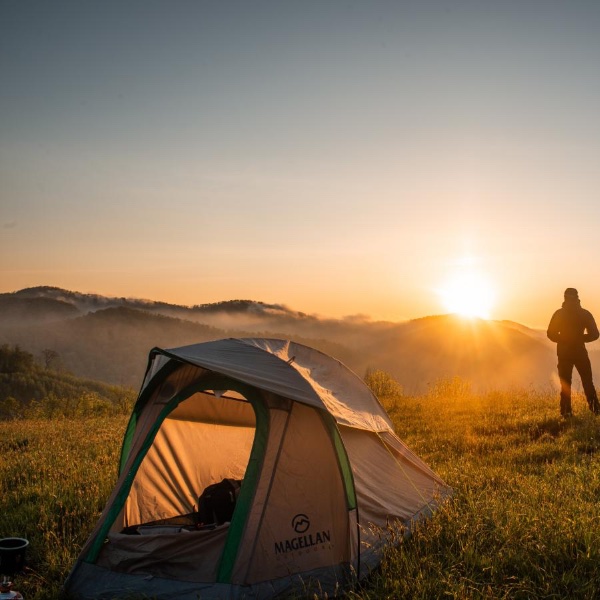
In this guide, we’ll explore five essential sustainable camping items that should find a place in every hiker’s backpack. Whether you’re embarking on a weekend escape or a longer adventure, these eco-friendly essentials will not only enhance your outdoor experience but also leave a positive impact on the environment. So, let’s dive into the world of sustainable camping and discover the must-have items for your next hike.
Section 1: What is Sustainable Camping?
Sustainable camping is more than just setting up a tent in the wilderness; it’s a conscious commitment to enjoying the outdoors while minimizing your environmental impact. At its heart, sustainable camping is about leaving nature as pristine as you found it, if not better.
Why Sustainable Camping Matters
Imagine arriving at a campsite surrounded by untouched forests, crystal-clear streams, and vibrant wildlife. The goal of sustainable camping is to ensure that the next visitor to that same spot enjoys the same beauty and serenity. It’s a promise to Mother Nature that you’ll tread lightly, respect the environment, and take every precaution to preserve its fragile ecosystems.
The Leave No Trace Principles
Central to sustainable camping are the Leave No Trace principles, which are like a code of ethics for outdoor enthusiasts. These principles advocate for responsible wilderness ethics, urging campers to minimize their impact on the environment. The seven Leave No Trace principles include:
- Plan Ahead and Prepare
- Travel and Camp on Durable Surfaces
- Dispose of Waste Properly
- Leave What You Find
- Minimize Campfire Impact (or use a camp stove)
- Respect Wildlife
- Be Considerate of Other Visitors
Deepening Your Knowledge
To gain a deeper understanding of these principles and how to apply them in your camping adventures, consider taking an online Leave No Trace course. These courses offer valuable insights, practical tips, and scenarios that will prepare you to be a responsible and eco-conscious camper.
By embracing the principles of sustainable camping and adhering to the Leave No Trace guidelines, you’re not only ensuring a more enjoyable outdoor experience for yourself but also contributing to the preservation of our natural wonders for generations to come. In the following sections, we’ll explore five sustainable camping essentials that align with these principles, enhancing your eco-friendly camping journey.
Section 2: Is Camping Good for the Environment?
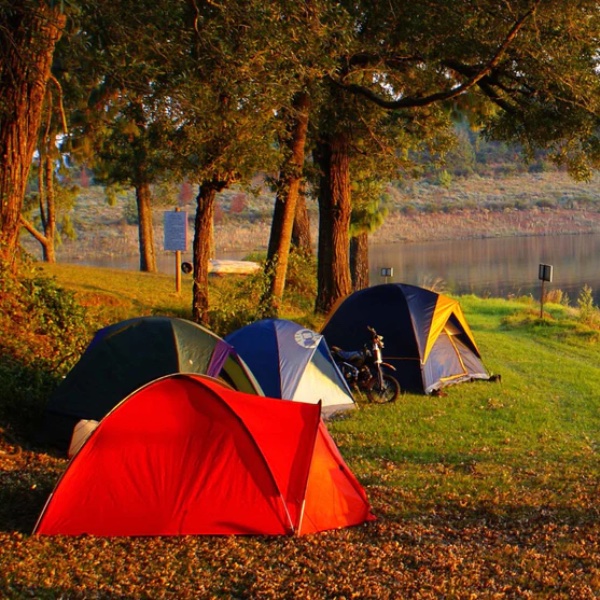
Camping, beyond its recreational value, holds the potential to be a powerful tool for fostering environmental awareness. The act of immersing oneself in nature often leads to a profound appreciation for the environment. However, this positive impact can be easily overshadowed by the negative consequences of irresponsible camping practices, such as leaving trash or gear behind. In this section, we’ll explore how camping can benefit the environment and offer guidance on minimizing your ecological footprint.
Camping and Environmental Consciousness
When you venture into the great outdoors, you become intimately connected with the natural world. The sights, sounds, and serenity of pristine landscapes often ignite a deep sense of responsibility towards preserving them. This newfound appreciation can translate into a heightened environmental consciousness, prompting you to take actions that benefit the ecosystems you visit.
The Dark Side of Camping: Leaving a Trace
Unfortunately, not all campers tread lightly on the environment. Irresponsible camping can result in littered campsites, damaged vegetation, and polluted water sources. The impact of discarded trash and gear left behind can be long-lasting and detrimental to the fragile ecosystems of remote wilderness areas.
Sustainable Camping Practices
Responsible campers are encouraged to take proactive steps to minimize their environmental impact:
- Choose Sustainable Gear: Opt for sustainable and secondhand camping gear whenever possible. Many outdoor retailers now offer eco-friendly equipment made from recycled materials.
- Borrow or Share Gear: Consider borrowing camping gear from friends and family, or even renting equipment. Sharing gear not only reduces waste but also minimizes your carbon footprint.
- Practice Leave No Trace: Adhere to the Leave No Trace principles mentioned earlier, especially regarding waste disposal and campsite cleanliness.
- Pack It Out: Bring back everything you bring with you, including trash. Leave your campsite cleaner than you found it.
By embracing these practices, you can ensure that your camping adventures contribute positively to both your environmental awareness and the preservation of the natural beauty that draws us to the outdoors. In the following sections, we’ll delve into five essential sustainable camping items that align with these principles, helping you become a more eco-conscious camper.
Section 3: Types of Camping
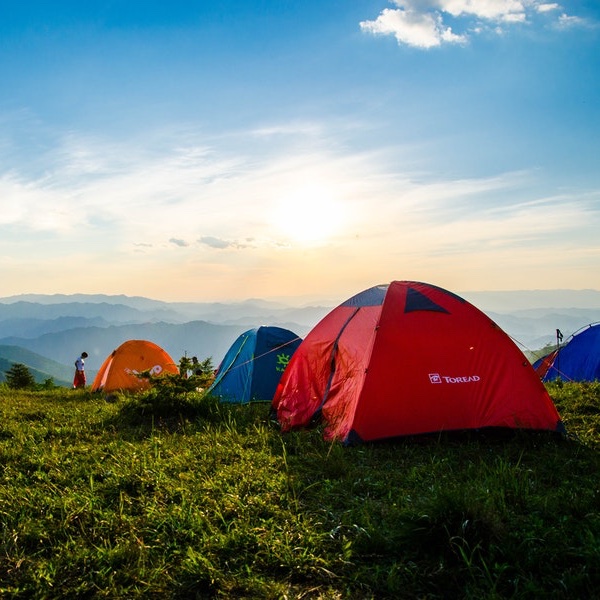
Camping is a versatile outdoor activity, and it comes in various forms, each requiring different gear and preparations. Understanding these camping styles is essential to ensure you have the right equipment and approach for an enjoyable and sustainable experience. In this section, we’ll explore three common types of camping: en route camping, attached to a destination camping, and destination camping.
1. En Route Camping – The Backpacker’s Choice
En route camping, often preferred by backpackers and hikers, involves continuous travel from one campsite to another. This style of camping is perfect for those who relish the adventure of exploration and enjoy covering ground on foot. Key features of en route camping include:
- Lightweight Gear: Backpackers carry minimal gear to reduce the weight they must carry on long hikes.
- Compact Shelter: Tents or shelters should be compact and easy to set up.
- Minimalist Cooking: Backpackers often rely on compact stoves for cooking meals.
- Sustainable Consideration: Due to the need to carry all gear, sustainability becomes crucial. Choose lightweight, eco-friendly gear that won’t weigh you down.
2. Attached to a Destination Camping – Comfort and Convenience
Attached camping is a great choice for those who want to enjoy nature without the rigors of backpacking. Campers stay at established campsites, which are typically accessible by car. Key features of attached camping include:
- Spacious Gear: You have more room to bring larger tents, comfortable bedding, and other conveniences.
- Cooking Options: You can bring more extensive cooking gear, including portable grills and coolers.
- Ease of Access: Campsites are accessible by car, making it simpler to transport gear and supplies.
- Eco-Friendly Options: Even in car camping, you can opt for sustainable gear and practices to minimize your impact.
3. Destination Camping – Creating a Base Camp
Destination camping involves setting up a base camp in a particular area and then exploring the surroundings from there. It’s an excellent choice for those who want to focus on a specific location or activity. Key features of destination camping include:
- Comfortable Base: Your campsite serves as a comfortable hub from which to explore.
- Diverse Gear: Depending on your activities, you might bring a variety of gear, such as hiking, fishing, or climbing equipment.
- Extended Stay: Destination camping often involves longer stays, so sustainability becomes even more critical.
- Respecting the Environment: Since you’ll spend more time in one place, it’s vital to adhere to Leave No Trace principles and minimize your impact.
Choosing the right camping style and gear that aligns with it is crucial for a sustainable camping experience. In the next section, we’ll discuss essential sustainable camping items that can enhance your outdoor adventures, regardless of your camping style.
Section 4: Becoming a Responsible Camper
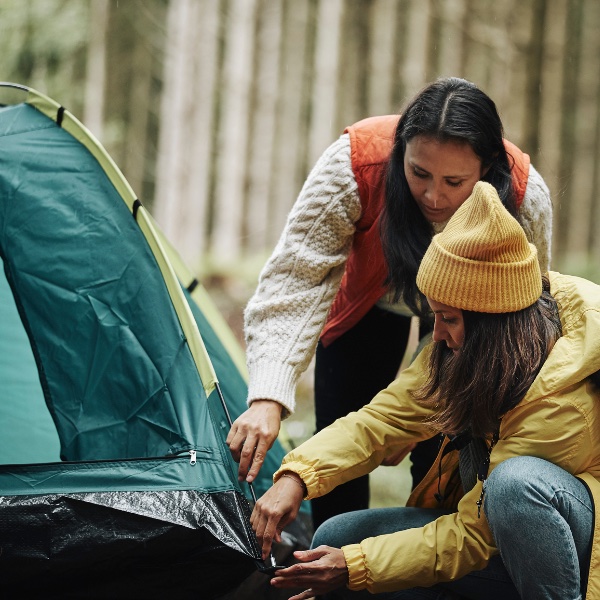
Becoming a responsible camper is not only about enjoying the great outdoors but also about preserving its beauty for generations to come. It involves embracing a set of practices that minimize your impact on the environment and promote sustainable camping. In this section, we’ll explore essential strategies and habits to help you become a more responsible and eco-conscious camper.
1. Zero-Waste Swaps
One of the key principles of sustainable camping is to reduce waste. Consider these zero-waste swaps for your camping trips:
- Reusable Containers: Instead of disposable plastic bags and containers, opt for reusable food storage containers and silicone food bags.
- Reusable Utensils: Pack durable, reusable utensils made from materials like bamboo or stainless steel.
- Biodegradable Toiletries: Choose biodegradable soap, shampoo, and toothpaste to minimize harm to local ecosystems when washing up.
2. Stay on Designated Trails
When hiking or exploring, it’s essential to stay on designated trails. Straying from established paths can damage fragile ecosystems, disrupt wildlife habitats, and lead to soil erosion. By staying on marked trails, you not only protect the environment but also ensure a safer and more enjoyable experience for yourself and fellow hikers.
3. Respect Wildlife
Observing wildlife can be a highlight of camping, but it’s crucial to do so responsibly:
- Maintain Distance: Keep a safe distance from animals to avoid disturbing them or putting yourself at risk.
- No Feeding: Do not feed wildlife, as it can disrupt their natural behaviors and harm their health.
- Store Food Securely: Properly store food to prevent wildlife from accessing it, which can lead to habituation and potentially dangerous encounters.
4. Dispose of Waste Properly
Proper waste disposal is a fundamental aspect of responsible camping:
- Pack It Out: Bring back all trash, including food scraps and used toiletries. Leaving anything behind can harm the environment and wildlife.
- Follow Leave No Trace Principles: Adhere to the Leave No Trace principles, including proper waste disposal and minimizing campfire impact.
5. One-Pot Meals for Sustainability
Consider preparing one-pot meals during your camping adventures. These meals require fewer cooking utensils and produce less waste, making them an eco-friendly choice. Plus, they simplify your cooking process and reduce the time spent cleaning up, allowing you to enjoy more time outdoors.
By incorporating these responsible camping practices into your outdoor adventures, you can minimize your ecological footprint and contribute to the preservation of our natural landscapes. In the next section, we’ll delve into five essential sustainable camping items that can enhance your eco-conscious camping journey.
Section 5: Sustainable Camping Essentials
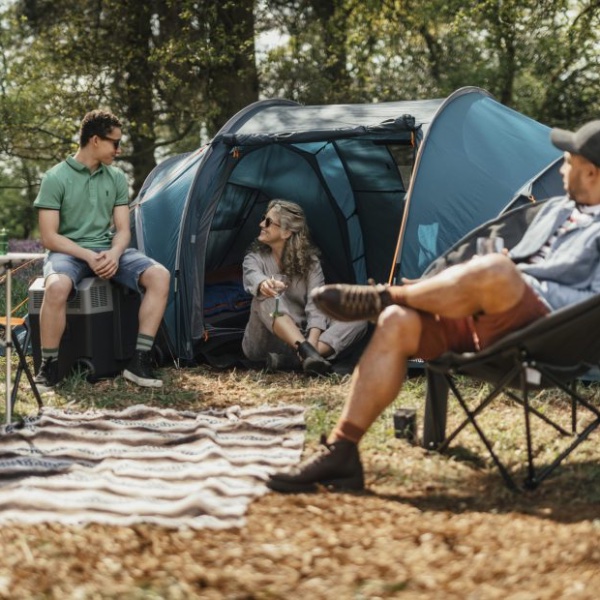
Embarking on a sustainable camping journey goes hand in hand with selecting the right gear. In this section, we’ll explore five essential sustainable camping items that will not only enhance your outdoor experience but also align with your eco-conscious principles. Whether you’re a seasoned camper or just starting your outdoor adventures, these items are essential for minimizing your environmental impact while maximizing your enjoyment of the great outdoors.
Here are 5 sustainable camping essentials which you should not be without:
1. Eco-Friendly Tent
A durable and eco-friendly tent is the cornerstone of any sustainable camping trip. Look for tents made from recycled materials, as well as those that use sustainable manufacturing processes. Some brands even offer tents with fair trade certifications, ensuring ethical production practices. An eco-friendly tent not only reduces your carbon footprint but also provides reliable shelter for your outdoor excursions.
Check out this range of eco-friendly tents by clicking here.
2. Recycled Sleeping Bag
Stay cozy during chilly nights with a recycled sleeping bag. Many companies now produce sleeping bags using recycled materials, reducing waste and conserving resources. These bags are just as warm and comfortable as traditional options, making them an excellent choice for eco-conscious campers.
Check out this range of sleeping bags made from recycled materials by clicking here.
3. Solar-Powered Charger
Stay connected and powered up with a solar-powered charger. These devices harness the sun’s energy to charge your electronics, reducing the need for disposable batteries and minimizing your reliance on fossil fuels. A solar-powered charger is a sustainable solution for keeping your gadgets, like smartphones and GPS devices, ready for use while camping.
Check out this solar chargers by clicking here.
4. Reusable Water Filtration System
Minimize the need for single-use plastic water bottles by investing in a reusable water filtration system. There are various options, from portable water filters to UV purifiers, that allow you to source clean and safe drinking water from natural water sources. This not only reduces plastic waste but also saves you money in the long run.
Check out this water filtration system by clicking here.
5. Ethical Cookware Set
Cooking in the great outdoors can be a delightful experience, especially when you have an ethical cookware set. Look for pots and pans made from sustainable materials like stainless steel or cast iron. These materials are durable and long-lasting, reducing the need for frequent replacements and minimizing waste.
Check out this ethical cookware set by clicking here.
Exploring Used Camping Equipment
Don’t overlook the world of used camping equipment when building your eco-friendly gear collection. Buying used gear is not only budget-friendly but also environmentally responsible, as it extends the lifespan of outdoor equipment and reduces the demand for new production.
By prioritizing sustainable camping essentials and choosing gear that aligns with your eco-conscious values, you’ll not only enjoy more fulfilling outdoor adventures but also contribute to the preservation of the natural wonders that make camping so enchanting.
In conclusion, sustainable camping is a commitment to responsible outdoor ethics, from minimizing waste to choosing eco-friendly gear. By incorporating these practices and essentials into your camping trips, you can ensure a positive impact on the environment while relishing the beauty of the great outdoors.
Conclusion
In the realm of outdoor adventure, sustainable camping is more than a passing trend; it’s a profound responsibility. As we witness a surge in camping interest, it becomes increasingly crucial to adopt practices that safeguard and preserve our natural environments. Sustainable camping embodies a commitment to minimizing our impact on the Earth, ensuring that future generations can revel in the splendor of the outdoors.
By adhering to the Leave No Trace principles, investing in eco-friendly gear which includes sustainable camping essentials, and embracing responsible camping habits, we strike a harmonious balance between enjoying the beauty of nature and safeguarding it for the future. As the sun sets on each campfire, we leave behind not just memories, but a legacy of respect for the great outdoors.
We invite all readers to share their sustainable camping tips, experiences, and insights. Together, we can ignite a movement toward a greener camping experience—one that not only enriches our lives but also nourishes and sustains the remarkable landscapes that beckon us into the wilderness. So, let’s embark on this journey with a collective commitment to tread lightly, leave no trace, and cherish the Earth’s beauty for generations to come.
Take a look at more eco travel stuff here.

